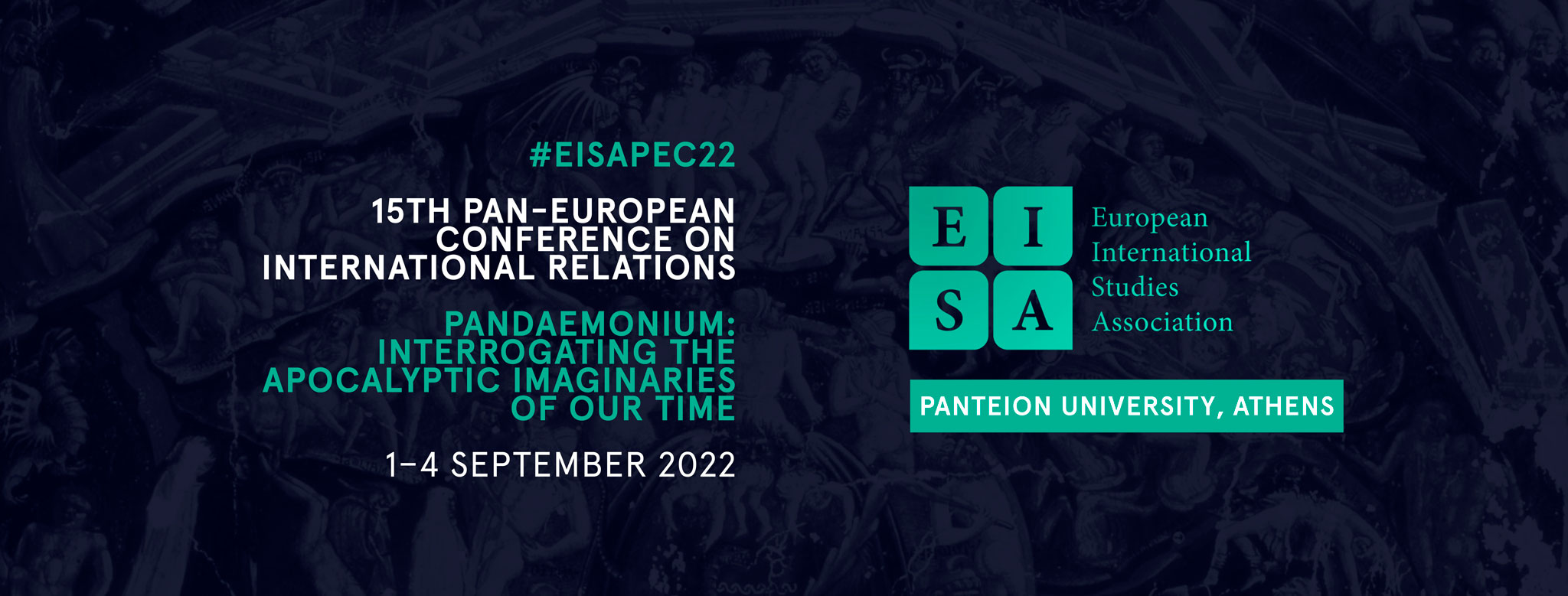On 1-4 September 2022, the PREVEX project participated with a panel in the 15th Pan-European Conference on International Relations (PEC) at Panteion University, Athens. The conference was hosted by European International Studies Association (EISA).

The panel, entitled Violent extremism, drivers and curtailers of “crises” in the EU neighbourhood, shed light on the complex interactions between violent extremism, its alleged drivers, and its countermeasures. Presenters included PI Morten Bøås (Norwegian Institute of International Affairs, Norway), Gilad Ben-Nun (University of Leipzig, Germany), Luca Raineri (Sant’Anna School of Advanced Studies, SSSA, Italy), Djallil Lounnas (Al Akhawayn University, Morocco), Alessio Iocchi (University of Naples l’Orientale, DAAM, Italy) and Sejla Pehlivanovic (Norwegian Institute of International Affairs, Norway). Panel Chair was Francesco Strazzari from Sant’Anna School of Advanced Studies.
Following an introduction by Chair Francesco Strazzari, Morten Bøås opened the panel by presenting a paper on the Sahel (co-written with Kari Osland), arguing that the overemphasis on a limited set of sensationalistic cases has led researchers to overlook the everyday – yet widespread – forms of resistance and resilience to extremist mobilisation in the Sahel region. Although the Sahel is more than often framed as an enabling environment where all conditions seen as conducive to the emergence of violent extremism are met, most people do not join extremist groups nor embrace their ideologies. Based on extensive ethnographic research in Mali and Burkina Faso, Bøås argues that most of the population – albeit disenfranchised – resort to overt or covert strategies of resistance to jihadist groups’ grip and rhetoric.
Gilad Ben-Nun continued with a cross-regional comparison of alleged drivers and curtailers of Islamist VE in the MENA, Maghreb-Sahel and Western Balkans, arguing that in spite of the common securitisation of violent extremism by the EU and local governments, the levels of mobilisation and impact of jihadist organisations has proved strikingly variable across different countries. Ben-Nun explores the hypothesis that ‘Sharifi’ kingdoms’ (Morocco and Jordan) inherent legitimacy, coupled with their increased attention to native Islamic good-governance values, might well have provided a hybrid approach to governance, enabling greater economic and political stability. In sum, Ben-Nun questioned the democracy vs. security dichotomy by emphasizing the significance of socially embedded political economies in explaining the outcomes of CT and CVE strategies.
Drawing attention to the Balkans, Sejla Pehlivanovic presented a paper on the state of violent extremism in Bosnia-Herzegovina, a context in which all the standard “factors” deem responsible for “violent extremism” are met but with few incidents which can be traced back to violent extremist groups. This non-occurrence must be understood in relation to the political and discursive space available – or unavailable – to Bosnia’s extreme movements, Pehlivanovic argued. Aiming to understand ‘limited extremism’ through the political environment, she explored the relationships between moderate state and powerful non-state actors operating in – and outside of – Bosnia’s political landscape.


Addressing the problem with the oft-noticed lack of a universally accepted definition of “terrorism”, Luca Raineri and Djallil Lounnas underscored the politicised drivers and securitised impacts of labelling (speech) act, especially evident in contexts where authoritarian regimes face contestations by groups whose legitimacy builds (also) on religious and sectarian narratives. Noting this ambiguity, Raineri and Lounnas unpacked the dynamics of political contention – whether armed or not – in the Maghreb and the Sahel region, where a variety of foreign interveners – first and foremost the EU – have invested considerable resources in fighting terrorists and extremists. Their analysis aimed to illuminate how international and transnational power relations contribute to framing, reproducing and contesting conflicting understandings of the normal and the exceptional, inclusion and exclusion, the terrorist and the freedom fighter. Abdoul Wahab Cissé (The Alliance for Rebuilding Governance in Africa, ARGA, Senegal) is co-author of this paper.
Turning attention to Lake Chad, Alessio Iocchi presented a work unpacking the manifold facets of the ‘Lake Chad crisis’, discussing the politically and morally charged construction of the ‘terrorist menace’ by pointing to differences and similarities to the rebellions of the 1970s and 1990s that occurred around Lake Chad. Methodologically, Iocchi’s contribution draws on the idea that terrorism and counter-terrorism are two mutually-shaping structures and that the inherent malleability of the counter-terrorism discourse has been employed by Lake Chad regimes for purposes of political legitimacy. The contribution is based on several years of research in Nigeria, Niger, Chad, and Cameroon, and mobilizes sources collected during fieldwork on Lake Chad.
In sum, PREVEX was well represented by researchers shedding light on the complex interactions between violent extremism, its alleged drivers, and its countermeasures. Panel contributors drew on different approaches to critical security studies – including discourse analysis, immersive ethnography, and social movement theories – to identify the “critical junctures” shaping the (social) construction of normalcy and exception, legitimization and contention, continuity and disruption, taking place in regions and countries framed as “crisis-prone”.



